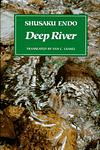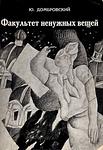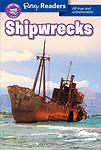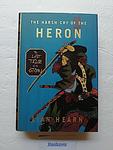The Greatest Russian, Japanese "Historical fiction, Fiction" Books Since 1950
Click to learn how this list is calculated.
This list represents a comprehensive and trusted collection of the greatest books. Developed through a specialized algorithm, it brings together 300 'best of' book lists to form a definitive guide to the world's most acclaimed books. For those interested in how these books are chosen, additional details can be found on the rankings page.
Genres
Historical fiction is a genre of literature that combines fictional stories with real historical events, settings, and characters. These books often take place in a specific time period and are based on research and factual information, but also include imaginative elements to create a compelling narrative. Historical fiction allows readers to experience the past in a unique and engaging way, while also providing insight into the social, cultural, and political issues of the time.
Countries
Date Range
Reading Statistics
Click the button below to see how many of these books you've read!
Download
If you're interested in downloading this list as a CSV file for use in a spreadsheet application, you can easily do so by clicking the button below. Please note that to ensure a manageable file size and faster download, the CSV will include details for only the first 500 books.
Download-
1. Doctor Zhivago by Boris Pasternak
Set against the tumultuous backdrop of the Russian Revolution, the book follows the life of a physician and poet, Yuri Zhivago, as he navigates the political and social upheaval of the early 20th century. Torn between his love for two women, his wife Tonya and his passionate mistress Lara, Zhivago's personal struggles mirror the larger societal changes occurring around him. The novel explores themes of love, war, and the human spirit, offering a poignant and complex portrait of life during a time of revolutionary change.
-
2. Life and Fate by Vasily Grossman
"Life and Fate" is a sweeping epic that explores the human condition during the Siege of Stalingrad in World War II. The novel delves into the lives of a wide range of characters, from soldiers and scientists to children and victims of the Holocaust, providing a stark and unflinching portrayal of the horrors of war, the brutality of totalitarianism, and the resilience of the human spirit. At the same time, it also examines themes of love, loss, and the struggle for freedom and dignity in the face of overwhelming adversity.
-
3. The Temple of the Golden Pavilion by Yukio Mishima
This novel follows the life of a young man named Mizoguchi, who becomes an acolyte at a famous Zen temple in Kyoto. Mizoguchi is afflicted with a stutter and a severe inferiority complex, which leads him to develop a destructive obsession with the temple's beauty. As he struggles with his personal demons, his fixation escalates into a desire to destroy the temple. The book is a profound exploration of beauty, obsession, and the destructive nature of ideals.
-
4. The Sea of Fertility by Yukio Mishima
"The Sea of Fertility" is a four-part epic that follows the life of Shigekuni Honda, a man who believes in reincarnation. The series spans several decades, beginning in the early 20th century and ending in the 1970s, and explores Japanese history, culture, and spirituality. As Honda encounters individuals he believes to be the reincarnations of his childhood friend, he grapples with questions of identity, mortality, and the nature of the soul.
-
5. Cancer Ward by Aleksandr Solzhenitsyn
"Cancer Ward" is a poignant novel set in a Soviet cancer hospital in the mid-1950s. It follows the lives and struggles of patients and doctors, exploring their personal histories, relationships, and the political environment of the time. The hospital serves as a metaphor for the oppressive Soviet state, with cancer symbolizing the malignant growth of totalitarianism. The book also explores themes of mortality, the human spirit, and the will to survive.
-
6. The Twilight Years by Sawako Ariyoshi
"The Twilight Years" is a poignant story revolving around the life of a middle-aged woman who is burdened with the responsibility of taking care of her ageing and ailing father-in-law while trying to balance her work and personal life. The novel explores the themes of old age, family responsibilities, societal expectations, and the struggles of women in a patriarchal society. It offers a critical examination of the social, cultural, and personal issues related to aging and care-giving in post-war Japan.
-
7. Summer in Baden-Baden by Leonid Tsypkin
"Summer in Baden-Baden" is a unique blend of fact and fiction that intertwines the author's own travels to Leningrad with a reimagining of Fyodor Dostoevsky's summer in Baden-Baden, Germany. The narrative shifts between the two journeys, exploring themes of obsession, identity, and the power of literature. The author's fascination with Dostoevsky serves as a lens through which he examines his own life and experiences as a Jew in Soviet Russia, while also providing a fresh perspective on the famous Russian author's life and works.
-
8. Black Rain by Masuji Ibuse
The novel is a poignant and detailed account of the aftermath of the atomic bombing of Hiroshima, as experienced by a Japanese family. Through the diary entries of a survivor and the narrative of the days that follow, the book explores the devastating impact of the bomb on the city's inhabitants, their struggle with radiation sickness, and the societal stigma they face. It delves into the physical and psychological trauma inflicted by the event, painting a somber picture of the human cost of war and the long-lasting effects of nuclear weapons on both individuals and communities.
-
9. August 1914 by Aleksandr Solzhenitsyn
"August 1914" is a historical novel set during the early days of World War I, focusing on the disastrous Battle of Tannenberg on the Eastern Front. The book provides a detailed portrayal of the Russian army's defeat, largely due to incompetent leadership and lack of communication. The narrative also delves into the lives of the soldiers and civilians involved, offering a broad examination of Russian society and the impending revolution.
-
10. The Waiting Years by Fumiko Enchi
The novel is a poignant exploration of the life of a Japanese woman in the late 19th and early 20th centuries, who endures the pain and humiliation of serving her husband's needs by finding him concubines. As she navigates the complexities of her role within a rigidly patriarchal society, she faces the emotional turmoil of sacrificing her own happiness for the sake of family duty and social expectations. The narrative delves into themes of female subjugation, the intricacies of marital relationships, and the silent resilience of women, offering a powerful critique of the era's gender dynamics and the personal costs of adhering to tradition.
-
11. Sofia Petrovna by Lydia Chukovskaya
The book is a poignant narrative set during the Stalinist purges of the 1930s in the Soviet Union. It follows the story of a loyal and hardworking widow who is confronted with the brutal reality of the regime when her beloved son is arrested on false charges. As she navigates the Kafkaesque bureaucracy to seek justice for her son, her faith in the government and its policies is shattered. The novel offers a harrowing look at the terror of the Great Purge and the impact of political oppression on the lives of ordinary citizens, as the protagonist grapples with the disintegration of her world and the moral dilemmas posed by a society steeped in fear and denunciations.
-
12. The Burn: A Novel in Three Books : (late Sixties--early Seventies) by Vassily Aksyonov
"The Burn: A Novel in Three Books : (late Sixties--early Seventies)" is a historical novel that explores the cultural and political landscape of the Soviet Union during the late 1960s and early 1970s. The book follows a group of intellectuals, artists, and dissidents who are striving to preserve their individuality and freedom in a society that is increasingly oppressive and conformist. The narrative is punctuated by surreal and fantastical elements, reflecting the characters' struggle to maintain their sanity and dignity in a world that seems to be spiraling into madness.
-
13. Deep River by Shūsaku Endō
"Deep River" is a profound exploration of faith, suffering, and redemption, told through the intertwined narratives of four Japanese survivors of World War II. Each character carries their own personal trauma and guilt, leading them on separate spiritual journeys that converge at India's holy Ganges River. As they grapple with their pasts and seek forgiveness and meaning in their lives, the novel delves into themes of cultural clash, religious conflict, and the human capacity for love and understanding amidst pain.
-
14. The Faculty of Useless Knowledge by Yuri Dombrovsky
"The Faculty of Useless Knowledge" delves into the life of a historian caught in the oppressive atmosphere of Stalinist Russia. The narrative explores the intellectual and emotional turmoil of the protagonist, who is ensnared in the brutal machinery of the Soviet state's ideological and bureaucratic control. Through his experiences and reflections, the book examines themes of memory, history, and the struggle to maintain intellectual integrity in a repressive society. The protagonist's journey is a poignant commentary on the value of knowledge and the human spirit's resilience against totalitarian forces.
-
15. Farewell To Matyora by Valentin Rasputin
The book is a poignant exploration of the tension between progress and tradition, set in a small Siberian village that is doomed to be submerged by the construction of a hydroelectric dam. As the government mandates the relocation of the village's inhabitants, the narrative delves into the lives of the villagers who are grappling with the loss of their ancestral home and way of life. The story is a meditation on the cost of modernization, the deep connection between people and their land, and the inevitable passing of time that brings change, often at the expense of cultural heritage and personal identity. Through the villagers' resistance and sorrow, the novel examines themes of environmental impact, the clash of ideologies, and the resilience of the human spirit in the face of displacement.
-
16. Runaway Horses by Yukio Mishima
"Runaway Horses" is a novel set in 1930s Japan, revolving around a young, ultra-nationalist named Isao who becomes disillusioned with the political corruption and Western influence he perceives in his country. Driven by a fervent idealism and inspired by a historical manifesto, Isao forms a secret society with the aim of assassinating key political figures to restore the emperor's divine power and traditional Japanese values. As Isao's radical commitment deepens, the story explores themes of loyalty, honor, and the clash between modernity and tradition, culminating in a dramatic and tragic conclusion.
-
17. Requiem by Shizuko Gō
"Requiem" is a poignant novel that delves into the emotional and psychological aftermath of the atomic bombing of Hiroshima. Through the eyes of its protagonist, a woman who survived the blast as a child, the narrative explores the enduring scars left by the tragedy, both on the city's landscape and its inhabitants' lives. As she grapples with her past trauma and the loss of her family, the story reveals the long-term effects of nuclear warfare and the struggle for healing and redemption amidst the pain of irrevocable loss. The novel serves as a powerful meditation on memory, survival, and the resilience of the human spirit in the face of unimaginable devastation.
-
18. Medea And Her Children by Lyudmila Ulitskaya
"Medea And Her Children" by Lyudmila Ulitskaya is a powerful and emotionally charged novel that delves into the complex relationships between a mother and her children. Set in Soviet Russia, the story follows the lives of three generations of women as they navigate the challenges of love, sacrifice, and the oppressive political climate. Through vivid and compelling storytelling, Ulitskaya explores the universal themes of family, loyalty, and the enduring strength of a mother's love.
-
19. Shipwrecks by Akira Yoshimura
The novel is a haunting tale set in a remote medieval Japanese village where the impoverished inhabitants rely on the grim practice of salvaging goods from shipwrecks to survive. The story follows a young boy who eagerly awaits the next shipwreck in the hope that it will bring enough wealth to prevent his family from starving or having to sell his sister into prostitution. As he grapples with the moral dilemma of desiring a disaster for his own gain, the narrative explores themes of fate, survival, and the blurred lines between misfortune and fortune. The stark and somber atmosphere of the novel underscores the harsh realities of life in a community caught in a cycle of desperation and the complex emotions that come with their reliance on the misfortunes of others.
-
20. Vagabond Volume 1 by Takehiko Inoue
This graphic novel follows the journey of a young, unruly Japanese swordsman in the 17th century, who embarks on a quest to become "invincible under the sun" after surviving a brutal battle that left most of his companions dead. Inspired by the life of a legendary historical figure, the protagonist's path is one of intense duels, personal growth, and philosophical exploration. As he travels, he encounters a diverse cast of characters, each contributing to his understanding of what it means to live and fight with purpose. The story blends visceral action with deep introspection, set against the backdrop of a beautifully rendered feudal Japan.
-
21. Klotsvog by Margarita Khemlin
"Klotsvog" is a poignant and introspective novel that follows the life of Maya Abramovna Klotsvog, a Jewish woman living in Soviet Russia during the 20th century. Through Maya's perspective, the book explores themes of identity, love, and the struggles faced by Jews in a society plagued by anti-Semitism. With a blend of humor and tragedy, the story delves into Maya's personal relationships, her experiences as a mother and wife, and her resilience in the face of adversity. Ultimately, "Klotsvog" is a profound exploration of one woman's journey through life and her unwavering spirit in the midst of societal challenges.
-
22. Harsh Cry Of The Heron by Lian Hearn
"Harsh Cry of the Heron" is set in a mythical, feudal Japan-like setting and continues the tale of the Otori clan, focusing on Lord Takeo and his efforts to maintain peace across the Three Countries. Despite his commitment to a peaceful reign and the abolishment of violent practices like warfare and capital punishment, Takeo faces inevitable betrayal and threats from within his own ranks and from external enemies. As prophecies of doom surface, Takeo struggles with maintaining his ideals and the harsh realities of leadership, leading to a dramatic and poignant conclusion that tests the limits of loyalty, honor, and sacrifice.
-
23. Zuleikha by Guzel Yakhina
"Zuleikha" is a captivating historical novel set in 1930s Soviet Union, following the life of Zuleikha, a Tatar woman who is forcefully taken from her home and exiled to Siberia. As she struggles to adapt to the harsh conditions of the remote village, Zuleikha finds solace in her resilience and the unexpected connections she forms with her fellow exiles. Through her journey of survival, love, and self-discovery, Zuleikha's story beautifully explores themes of identity, freedom, and the indomitable human spirit.
Reading Statistics
Click the button below to see how many of these books you've read!
Download
If you're interested in downloading this list as a CSV file for use in a spreadsheet application, you can easily do so by clicking the button below. Please note that to ensure a manageable file size and faster download, the CSV will include details for only the first 500 books.
Download




















